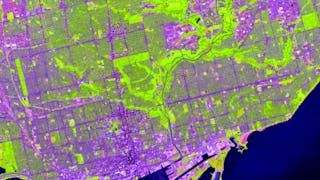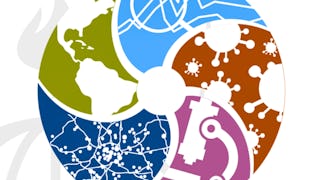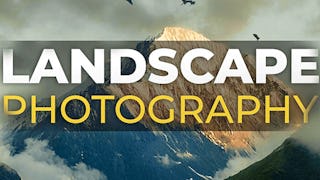Geographic Information Systems
Geographic Information Systems (GIS) is a framework for gathering, managing, and analyzing location-based data and associated attributes. Coursera's GIS catalogue teaches you about the principles and applications of GIS, from creating maps to performing spatial analysis. You'll learn how to leverage GIS technology to visualize, question, analyze, and interpret data to better understand relationships, patterns, and trends in the world around us. You'll also delve into topics like geocoding, remote sensing, spatial statistics, and GIS software tools. These skills will be invaluable in fields such as urban planning, environmental science, transportation, and public health, where understanding the geographic aspect of data is critical.
15credentials
60courses
Most popular
 Status: Free TrialFree TrialU
Status: Free TrialFree TrialUUniversity of California, Davis
Specialization
 Status: Free TrialFree TrialU
Status: Free TrialFree TrialUUniversity of California, Davis
Course
 Status: Free TrialFree TrialU
Status: Free TrialFree TrialUUniversity of Toronto
Specialization
 Status: Free TrialFree TrialJ
Status: Free TrialFree TrialJJohns Hopkins University
Specialization
Trending now
 Status: Free TrialFree TrialU
Status: Free TrialFree TrialUUniversity of California, Davis
Specialization
 Status: Free TrialFree TrialJ
Status: Free TrialFree TrialJJohns Hopkins University
Specialization
 Status: Free TrialFree TrialU
Status: Free TrialFree TrialUUniversity of Toronto
Specialization
 Status: Free TrialFree TrialU
Status: Free TrialFree TrialUUniversity of California, Davis
Course
New releases
 Status: Free TrialFree TrialC
Status: Free TrialFree TrialCCase Western Reserve University
Course
 Status: PreviewPreviewT
Status: PreviewPreviewTThe University of Edinburgh
Course
 Status: Free TrialFree TrialS
Status: Free TrialFree TrialSSkillshare
Specialization
 Status: Free TrialFree Trial
Status: Free TrialFree TrialCourse
Filter by
SubjectRequired *
Required
*LanguageRequired *
Required
*The language used throughout the course, in both instruction and assessments.
Learning ProductRequired *
Required
*Build job-relevant skills in under 2 hours with hands-on tutorials.
Learn from top instructors with graded assignments, videos, and discussion forums.
Learn a new tool or skill in an interactive, hands-on environment.
Get in-depth knowledge of a subject by completing a series of courses and projects.
LevelRequired *
Required
*DurationRequired *
Required
*SubtitlesRequired *
Required
*EducatorRequired *
Required
*Results for "geographic information systems"
Sort by: Best Match







